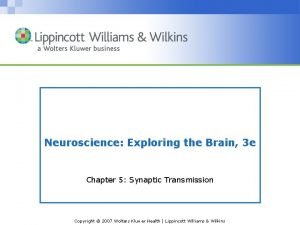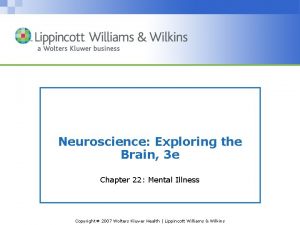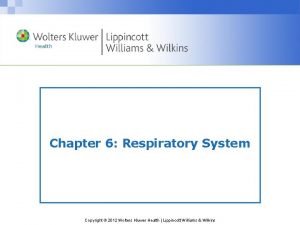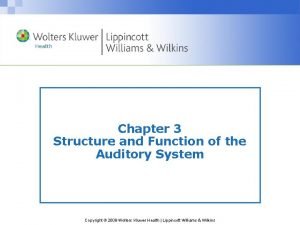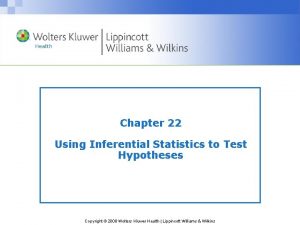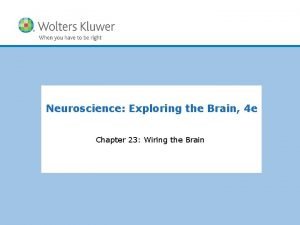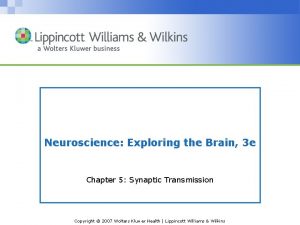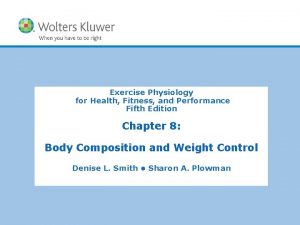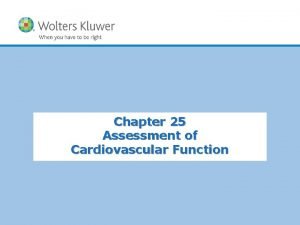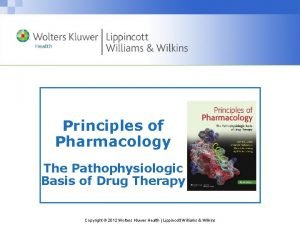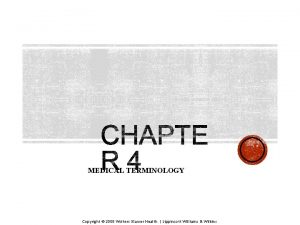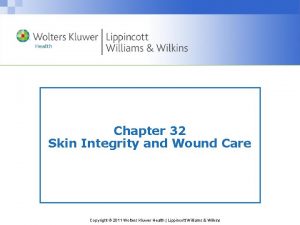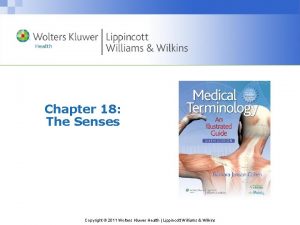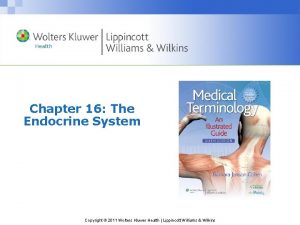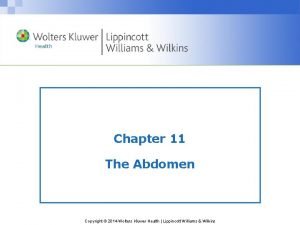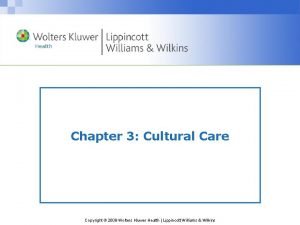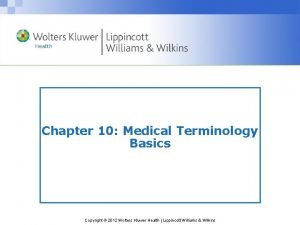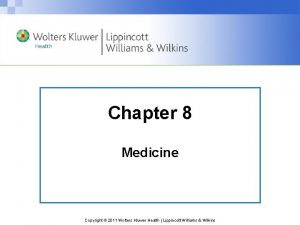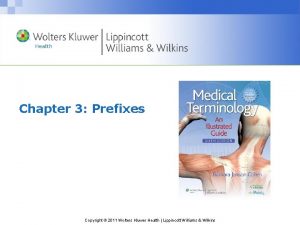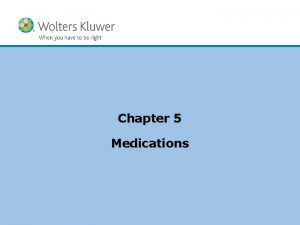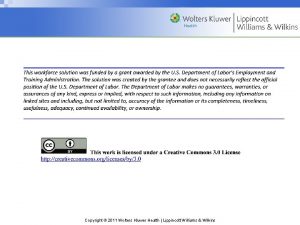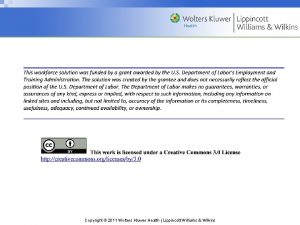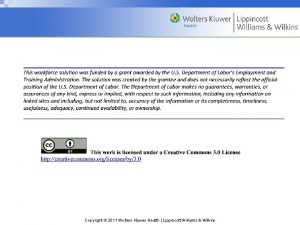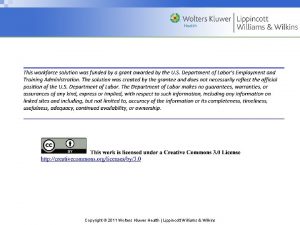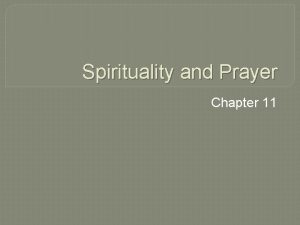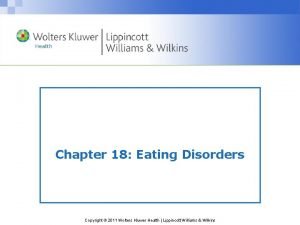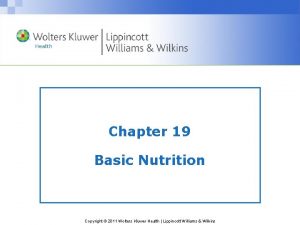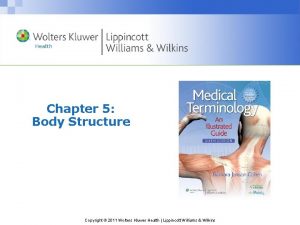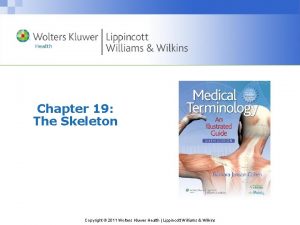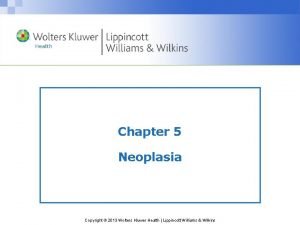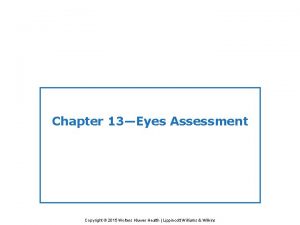Chapter 45 Spirituality Copyright 2011 Wolters Kluwer Health
































- Slides: 32

Chapter 45 Spirituality Copyright © 2011 Wolters Kluwer Health | Lippincott Williams & Wilkins

Three Spiritual Needs (Shelly & Fish. 1988) • Need for meaning and purpose • Need for love and relatedness • Need forgiveness Copyright © 2015 Wolters Kluwer • All Rights Reserved

The Spiritual Dimension: Integrated Approach Copyright © 2015 Wolters Kluwer • All Rights Reserved

The Spiritual Dimension: Unifying Approach Copyright © 2015 Wolters Kluwer • All Rights Reserved

Meeting Spiritual Needs • Offering a compassionate presence • Assisting in the struggle to find meaning in the face of suffering, illness, and death • Fostering relationships that nurture the spirit • Facilitating patient’s expression of religious or spiritual beliefs and practices Copyright © 2015 Wolters Kluwer • All Rights Reserved

Concepts Related to Spirituality • Spirituality: anything that pertains to the person’s relationship with a nonmaterial life force or higher power • Faith: a confident belief in something for which there is no proof or evidence • Religion: term used to describe cultural or institutional religion • Hope: ingredient in life responsible for a positive outlook • Love: connectedness with others • Spiritual health and healing: spiritual needs are met • Spirituality and everyday living—in health and illness Copyright © 2015 Wolters Kluwer • All Rights Reserved

Question Tell whether the following statement is true or false. A patient who does not belong to an organized religion does not have spiritual needs that can be addressed by the nursing practice. A. True B. False Copyright © 2015 Wolters Kluwer • All Rights Reserved

Answer: B. False Rationale: A patient who does not belong to an organized religion may still have spiritual needs that can be addressed by the nursing practice. Copyright © 2015 Wolters Kluwer • All Rights Reserved

Elements of Spirituality (Burghardt & Nagai-Jacobson, 1997) • Experienced as a unifying force, life principle, and an essence of being • Experienced in and through connectedness with nature, the earth, the environment, and the cosmos • Expressed in and through connectedness with other people • Shapes the self-becoming and is reflected in one’s being, knowing, and doing • Provides purpose, meaning, strength, and guidance to shape the journey Copyright © 2015 Wolters Kluwer • All Rights Reserved

Beliefs Related to Faith • Agnostic: one who holds that nothing can be known about the existence of a higher power • Atheist: person who denies the existence of a higher power Copyright © 2015 Wolters Kluwer • All Rights Reserved

Religious Influences • Life affirming: enhance life, give meaning and purpose to existence, strengthen self, are health giving and life sustaining • Life denying: restrict or enclose life patterns, limit experiences and associations, place burdens of guilt on individuals, are health denying and life inhibiting Copyright © 2015 Wolters Kluwer • All Rights Reserved

Religious Beliefs • Guide to daily living habits • Source of support • Source of strength and healing • Source of conflict Copyright © 2015 Wolters Kluwer • All Rights Reserved

Factors Affecting Spirituality • Developmental considerations • Family • Ethnic background • Formal religion • Life events Copyright © 2015 Wolters Kluwer • All Rights Reserved

A Child’s Perceptions of God • God works through intimacy and the interconnectedness of lives. • God is involved in self-change and growth and transformation that make the world fresh, alive, and meaningful. • God has tremendous power, and children show considerable anxiety in face of it. • God is an image of light. Copyright © 2015 Wolters Kluwer • All Rights Reserved

Common Characteristics of Religions • Basis of authority or source of power • Portion of scripture or sacred word • Ethical code defining right or wrong • A psychology and identity • Aspirations or expectations • Some ideas about what follows death Copyright © 2015 Wolters Kluwer • All Rights Reserved

Question Which religion opposes the “false teaching” of other sects, which often extends to modern science, including medicine? A. Native American B. Unification Church C. Buddhism D. Jehovah’s Witnesses Copyright © 2015 Wolters Kluwer • All Rights Reserved

Answer: D. Jehovah’s Witnesses Rationale: Jehovah’s Witnesses oppose what they consider the false teachings of other sects and believe that blood transfusions violate God’s laws and are not allowed. They may also refuse life-saving treatments for their children and discourage the use of alcohol and tobacco. Copyright © 2015 Wolters Kluwer • All Rights Reserved

O’Brien’s Spiritual Assessment Guide • Spiritual pain • Spiritual alienation • Spiritual anxiety • Spiritual guilt • Spiritual anger • Spiritual loss • Spiritual despair Copyright © 2015 Wolters Kluwer • All Rights Reserved

Question A Catholic college student who does not attend Mass on Sundays may experience which type of spiritual distress? A. Spiritual pain B. Spiritual anxiety C. Spiritual anger D. Spiritual despair Copyright © 2015 Wolters Kluwer • All Rights Reserved

Answer B. Spiritual anxiety Rationale: Spiritual anxiety may occur when a person challenges one’s beliefs and value system. Spiritual distress can be specified as spiritual pain, alienation, anxiety, guilt, anger, loss, or despair. Copyright © 2015 Wolters Kluwer • All Rights Reserved

Nursing Diagnoses for Spiritual Problems • Readiness for enhanced spiritual well-being • Spiritual distress Copyright © 2015 Wolters Kluwer • All Rights Reserved

Patient Goals/Outcomes • Identify spiritual beliefs that meet needs for meaning and purpose, love and relatedness, and forgiveness. • Derive strength, hope, and comfort from these beliefs. • Develop spiritual practices that nurture communion with inner self, God, and the world. • Express satisfaction with compatibility of spiritual beliefs and everyday living. Copyright © 2015 Wolters Kluwer • All Rights Reserved

Question Tell whether the following statement is true or false. Nurses can be helpful in recommending means for patients to develop a relationship with one’s inner world and manifest spiritual energy in one’s outer world. A. True B. False Copyright © 2015 Wolters Kluwer • All Rights Reserved

Answer: A. True Rationale: Nurses can be helpful in recommending means for patients to develop a relationship with one’s inner world and manifest spiritual energy in one’s outer world. Copyright © 2015 Wolters Kluwer • All Rights Reserved

Patient Goals/Outcomes: Spiritual Distress • Explore the origin of spiritual beliefs and practices. • Identify factors in life that challenge spiritual beliefs. • Explore alternatives to these challenges. • Identify spiritual supports. • Report or demonstrate decreased spiritual distress after intervention. Copyright © 2015 Wolters Kluwer • All Rights Reserved

Implementing Spiritual Care • Offering supportive presence • Facilitating patient’s practice of religion • Nurturing spirituality • Praying with a patient • Praying for a patient • Counseling the patient spiritually • Contacting a spiritual counselor • Resolving conflicts between treatment and spiritual activities Copyright © 2015 Wolters Kluwer • All Rights Reserved

Question Tell whether the following statement is true or false. Formal prayer should not be used with patients as it may alienate them. A. True B. False Copyright © 2015 Wolters Kluwer • All Rights Reserved

Answer: B. False Rationale: Formal prayer is appropriate if the patient desires it, but the religious background of the patient should be considered first. Copyright © 2015 Wolters Kluwer • All Rights Reserved

Facilitating the Practice of Religion • Familiarize the patient with religious services within the institution. • Respect the patient’s need for privacy during prayer. • Assist the patient to obtain devotional objects and protect them from loss or damage. • Arrange for the patient to receive sacraments if desired. • Attempt to meet dietary restrictions. • Arrange for a priest, minister, or rabbi to visit if the patient wishes. Copyright © 2015 Wolters Kluwer • All Rights Reserved

Counseling Patients Spiritually • Have the patient articulate spiritual beliefs. • Explore the origin of the patient’s spiritual beliefs and practices. • Identify life factors that challenge the patient’s spiritual beliefs. • Explore alternatives when given these challenges. • Develop spiritual beliefs that meet the need for meaning and purpose, care and relatedness, and forgiveness. Copyright © 2015 Wolters Kluwer • All Rights Reserved

Room Preparation for Spiritual Counselor Visit • Make sure the room is orderly and free of unnecessary equipment. • Provide a seat for the counselor near the patient’s bed. • Clear the top of the bedside table and cover with a clean white cloth for sacraments. • Draw the bed curtains if the patient cannot be moved to a private setting. Copyright © 2015 Wolters Kluwer • All Rights Reserved

Evaluating Expected Outcomes • Identify some spiritual belief that gives meaning and purpose to life. • Move toward healthy acceptance of the current situation. • Develop mutually caring relationships. • Reconcile interpersonal differences causing anguish. • Verbalize satisfaction with relationship with God. • Express peaceful acceptance of limitations and failings. • Express ability to forgive others and live in the present. • Demonstrate interior state of joy, freedom from anxiety and guilt. Copyright © 2015 Wolters Kluwer • All Rights Reserved
 Wolters kluwer health
Wolters kluwer health Wolters kluwer health
Wolters kluwer health Wolters kluwer health
Wolters kluwer health Lippincott williams & wilkins
Lippincott williams & wilkins Wolters kluwer
Wolters kluwer Wolters kluwer
Wolters kluwer Wolters kluwer health
Wolters kluwer health Wolters kluwer health
Wolters kluwer health Wolters kluwer health lippincott williams & wilkins
Wolters kluwer health lippincott williams & wilkins Edgar lopategui corsino
Edgar lopategui corsino Wolters kluwer
Wolters kluwer Shunting inhibition
Shunting inhibition Wolters kluwer
Wolters kluwer Wolters kluwer
Wolters kluwer Wolters kluwer
Wolters kluwer Virchow's triad
Virchow's triad Wolters kluwer pronunciation
Wolters kluwer pronunciation Wolters kluwer
Wolters kluwer Copyright
Copyright Wolters kluwer
Wolters kluwer Wolters kluwer
Wolters kluwer Physical examination techniques
Physical examination techniques Wolters kluwer ovid
Wolters kluwer ovid Wolters kluwer culture
Wolters kluwer culture Wolters kluwer pronunciation
Wolters kluwer pronunciation Kluwer
Kluwer Kluwer congres
Kluwer congres Six ministerial priorities in south africa
Six ministerial priorities in south africa Sbirt faith and spirituality
Sbirt faith and spirituality The 12 core values
The 12 core values Difference between spirituality and religion
Difference between spirituality and religion Spirituality definition
Spirituality definition 5 elements of salesian youth spirituality
5 elements of salesian youth spirituality


